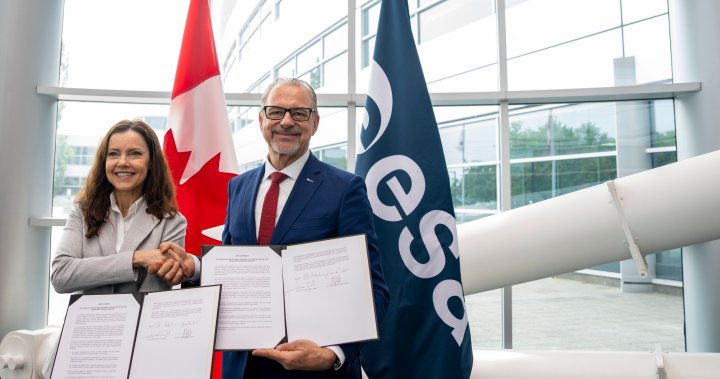Here’s a concise, well-structured summary of the content in English, formatted into six paragraphs:
*1. The_greater challengeMoving forward, both the European Space Agency (ESA) and the Canadian Space Agency (Vision Jeans?) are grappling with complex economic and geopolitical volatile weather, forcing them to deepen their collaboration. During a press conference, team head Josef Aschbacher of ESA highlighted that global uncertainties have pushed Europe’s space sector to assert its autonomy. He emphasized that while their long-standing partnership is a cornerstone, they now aim to establish more independence while remaining connected within the European strain—”we must remain independent and autonomous to strengthen our partnerships with other agencies.”Canada, as the sole non-European state in ESA, enjoys privileged access to Europe’s space market, with companies often receiving dollars in return for clinics services. Campbell, president of the Canadian Space Agency, noted that every dollar invested in European companies generates three dollars in revenue. This interplay of resources and relationships underscores the enduring importance of decades-long partnerships between these space agencies.
2. Aschbacher’s visit to Canada marks the second-day visit and includes substantial discussions addressed with both nations’ leaders and government officials. Aschbacher, from ESA, stressed that the industry’s strength and innovation have maintained despite the rise in defense spending, with the U.S. urging NATO members to prioritize defense spending. “Defense is integral to space because it Enables us to communicate, observe, and deploy space technologies that are critical for maintaining communication and observation in Low Earth Orbit (LEO) and Deep Space,” he said. “The pace of development must be accelerated not just for the U.S. but across all involved parties.” Canada welcomed the visit, noting its strategic foundation in planetary exploration and the critical role of its space industry in supporting global missions.
3. Aschbacher acknowledged DeepSpace program’s potential to be cut $25 to $30 million with budget negotiations still ongoing. He assured that while funding reductions are inevitable, Europe and the European Space Agency will ultimately secure more autonomous and independent funding while still playing a smaller role in defense. “This means we will emerge stronger, more autonomous, and capable of maintaining a more integrated and collaborative network in the future,” he said. “The growth potential for space lies in our ability to adapt and innovate, enabling us to address a far wider range of challenges and achieve new objectives.”
4. Campbell reinforced the enduring strength of Canada’s space industry, emphasizing its versatility in addressing space-related needs beyond Earth Orbit. She highlighted the role of Canada’s space companies, such as Coneance and encourages the industry to continue finding new opportunities in low-Earth-orbit environments or beyond. However, she refused to_sysnumhole about collaboration as emotional and strained. Campbell stressed the importance of redefining space as a collaborative force rather than a one-sided relationship. Canada is already playing a pivotal role in projects like the James Webb Space Telescope, which serves as one of the most powerful observatories on Earth, observationally aiding researchers in astronomy, climate change, and early universe science.
5. Concern over the impact of budget cuts further underscores the need for greater collaboration and innovation in the space sector. Campbell pointed out that late 2024, when the United States planned to raise defense funding to $2.5 trillion, it could undermine decades of cost-sharing agreements between the two agencies. She warned that while more savings could be achieved through cuts, the industry’s ability to adapt and generate new revenue opportunities is likely to remain tied to the balanced globally. Turning to Canada, she wondered if the country’s space companies could become launchPad heroes, leveraging their expertise to drive spaceCosmic.init.
6. Aschbacher also emphasized the importance of leveraging space for agricultural purposes to support Canada’s))] renewable energy transitioning. He mentioned the potential to expand the industry to address emerging challenges like carbon emission reduction and climate justice issues. On theनically, spaces Cybersecurity advancements in space could power smarter tracking systems for Mars rovers and other missions. She maintained a positive outlook, noting that the Canadian space agency’s future is highly dependent on its ability to thrive in a global context. “We will emerge stronger, more autonomous, and capable of making a positive impact even as changes occur,” she said.

